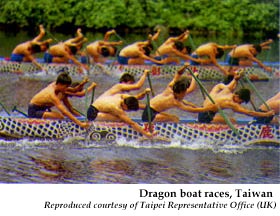Chinese Festivals
The oldest and most important festival in China is the Spring Festival, more commonly known in the West as Chinese New Year. Like all Chinese festivals, the date of the new year is determined by the lunar calendar rather than the Western (Gregorian) calendar, so the date of the holiday varies from late January to early February.
The Spring festival celebrates the earth coming back to life, and the start of ploughing and sowing. In the past, feudal rulers of dynasties placed great importance on this occasion, and ceremonies to usher in the season were performed.
Preparations for the New Year festival start during the last few days of the last moon. Houses are thoroughly cleaned, debts repaid, hair cut and new clothes bought. Doors are decorated with vertical scrolls of characters on red paper whose texts seek good luck and praise nature, this practice stemming from the hanging of peach-wood charms to keep away ghosts and evil spirits. In many homes incense is burned, and also in the temples as a mark of respect to ancestors.
On New Year's Eve houses are brightly lit and a large family dinner is served. In the south of China sticky-sweet glutinous rice pudding called nian gao is served, while in the north the steamed dumpling jiaozi is popular. Most celebrating the festival stay up till midnight, when fireworks are lit, to drive away evil spirits. New Years day is often spent visiting neighbours, family and friends.
The public holiday for New Year lasts 3 days in China, but the festival traditionally lasts till the 15th day of the lunar month and ends with the ‘Lantern Festival'. Here, houses are decorated with colourful lanterns, and yuanxioa, a sweet or savoury fried or boiled dumpling made of glutinous rice flour is eaten.
Qing Ming (Pure Brightness Festival)
On the 3rd day of the 3rd lunar month (usually around the 4th or 5th of April) the Qing Ming festival is celebrated. This is a time when ice and snow has gone and plants are beginning to grow again, and is a time for respect to ancestors. The graves of deceased relatives are swept and tended, the memory of the dead cherished and offering of food may be made. To assist ancestors in the afterlife 'Bank of Hell' money is burned, thereby transferring money to the ancestors to spend as they will. Qing Ming is often marked by an indulgence of the Chinese passion for kite flying.
Duan Wu (Dragon Boat Festival)
The Dragon Boat festival dates back to ancient times and occurs on the fifth day of the fifth lunar month. Originally a religious practice, it is now purely recreational. The Dragon Boat festival celebrates the death of t he poet Qu Yuan, who drowned himself in the 3rd Century BC as a protest against a corrupt government. The legends are that the towns people attempted to rescue him by beating drums to scare fish away from eating his body and threw rice dumplings into the river to tempt the fish away from their hero.
he poet Qu Yuan, who drowned himself in the 3rd Century BC as a protest against a corrupt government. The legends are that the towns people attempted to rescue him by beating drums to scare fish away from eating his body and threw rice dumplings into the river to tempt the fish away from their hero.
Pyramid shaped glutinous rice cakes known as zongzi are eaten to mark the festival, and along the rivers and coasts dragon-boat races are performed. In these high-spirited competitions long, sleek boats with dragon heads on the prow are propelled by teams of rowers stroking their oars in unison.
Zhong Qiu (Mid-Autumn Festival)
Probably the second most important festival in the Chinese calendar, Zhong qiu has ancient origins. Occurring on the 15th day of the 17th lunar month (usually some time around the end of September/start of October) the Mid-autumn festival celebrates the moon. Traditionally a time for poets and lovers, in Chinese symbolism the moon symbolises unity and wholeness and is a time for reunion of families. Abundant meals are eaten during the festival and moon cakes, round pastries filled with nuts, dried fruits, preserved flowers, sesame and/or marinated beef or bacon are eaten.
Other Chinese Festivals and their approximate Western dates are:
Birthday of Che Kung (February)
Birthday of Tin Hau (May)
Cheung Chau Bun Festival (April/May)
Birthday of Lord Buddha (May)
Birthday of Kwan Tai (May)
Maidens (Seven Sisters) Festival (August)
Hungry Ghosts Festival (August/September)
Monkey God Festival (September)
Birthday of Confucius (September)
China National Day (1st October)